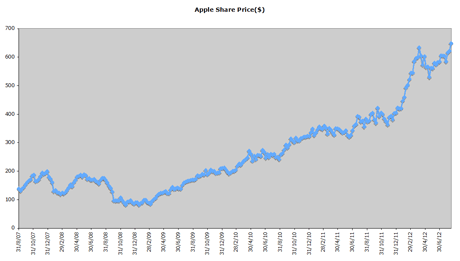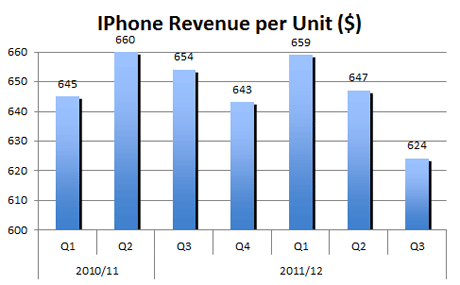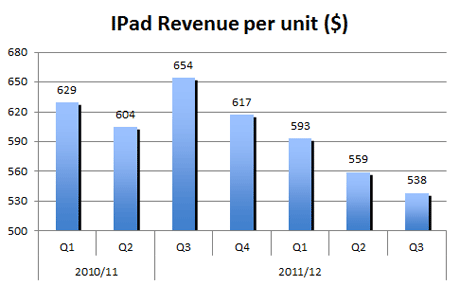Are Apple shares still a great investment?
Apple's shares have rocketed in price. But can the good times continue, and should you still buy the shares? Phil Oakley investigates.
Get the latest financial news, insights and expert analysis from our award-winning MoneyWeek team, to help you understand what really matters when it comes to your finances.
You are now subscribed
Your newsletter sign-up was successful
Want to add more newsletters?

Twice daily
MoneyWeek
Get the latest financial news, insights and expert analysis from our award-winning MoneyWeek team, to help you understand what really matters when it comes to your finances.

Four times a week
Look After My Bills
Sign up to our free money-saving newsletter, filled with the latest news and expert advice to help you find the best tips and deals for managing your bills. Start saving today!
Apple shares just seem to keep going up and have increased by over 80% during the last year. Virtually every Wall Street analyst is a buyer. Some commentators talk of Apple having a market value of $1trn one day.
But can the good times continue?
Only if Apple can keep its customers happy and fend off its competition without cutting prices. And here, history is not on its side.
MoneyWeek
Subscribe to MoneyWeek today and get your first six magazine issues absolutely FREE

Sign up to Money Morning
Don't miss the latest investment and personal finances news, market analysis, plus money-saving tips with our free twice-daily newsletter
Don't miss the latest investment and personal finances news, market analysis, plus money-saving tips with our free twice-daily newsletter
Great products and great profits
Apple is a phenomenon. It has a range of products in the form of iPhones, iPads and Mac computers that customers love. Across the world people have been buying its products in droves and Apple's profits and share price have soared.
Apple is a staggeringly profitable business. During the last year its operating income has been nearly $36bn on a net capital investment of just over $12bn - giving it a return on investment of nearly 300%!
In many industries, returns like this would attract companies into the market and they would be competed away. Why isn't this happening?

(Click on the chart for a larger version)
Because most of its competition cannot copy what Apple is doing. So far, Apple has succeeded in selling products that seamlessly link up with each other with innovative new features.But things can change.
Can the iPhone fend off competition?
Take the smartphone market. Nokia has been slow to enter this market and has backed the wrong type of technology in Windows. HTC has struggled to grow despite having what many experts saw as a good product. But is the iPhone still a long-term winner from here?
It could be but the market is very interesting. The fact that Apple and Samsung are embroiled in a legal battle over smartphone patents is quite revealing. Samsung is making some good phones such as the Galaxy S III which is a good competitor to the iPhone, especially outside America. Is Apple relying on the courts to protect itself against Samsung?
Then there is Google. At the moment, its interest in the smartphone market is with its Android operating system. Phones with Android are actually outselling the iPhone globally. Developers like its open platform and the phones do most of the things an iPhone can. On top of that they are also cheaper.
An iPhone 4S costs about £500 (before phone companies discount them) whereas Samsung's Galaxy SIII comes in at about £440. In many Asian markets where the iPhone is out of reach for many consumers, there are lots of cheap Android phones but no cheap Apple ones.
But does Google make much money out of Android?
Making money out of mobile advertising is not easy. If you look at Apple, you'd say that selling handsets is the way to go. This is where Google could threaten Apple. It bought the Motorola phone business and could use this to make a Google phone with its highly rated Chrome operating system.
The other potential concern on the iPhone is how long will mobile phone companies particularly US ones - keep spending money keeping it affordable for customers?
The iPhone has been great for them, as people have wanted this 'must-have' product. But mobile operators- not Apple have had to spend money to keep these products affordable. With revenues under pressure due to falling call rates, will they keep doing this? If they don't, then will Apple sell as many iPhones?
The tablet market looks less competitive
The competitive landscape in tablets looks easier for Apple. No one is really taking on its iPad. Samsung has had a go whilst the Kindle Fire is not really taking off. The iPad looks like it has become an iconic brand, and for many young people it is their idea of a computer.
How long can Apple defy the economics of consumer electronics?
Arguably one of the key reasons behind Apple's success is its ability to keep innovating without cutting prices. Most consumer electronics products fall in price. That's why the companies that make them always want you to upgrade to the latest model. Apple has been very good at doing this.
Five years ago, an entry-level iMac computer would cost you about £1,000 in the UK. Now, you get a better computer but it still costs about the same.


But how long can Apple keep doing this?
As you can see, the iPhone's achieved revenue per unit has been quite resilient. However, Apple is getting $116 less for each iPad than it was a year ago. That's fine if it's costing less to make them. But it's a potential profit problem if they are not or it can't sell more of them.
That's why the stock market gets excited about new products such as the iPhone 5 or Apple TV. It thinks that Apple can wave its magic wand and bring out another money-making product that keeps profits growing.
Common sense suggests that there are limits to how long any company can keep doing this. In Apple TV, Apple will have to take on the might of the cable operators. Will people want to buy what will probably be an expensive box when their cable operator will give them one for virtually nothing?
The TV market is different to computers and mobile phones. Content is much more important to people. Apple has the firepower to buy lots of content but it's going to be more difficult to see the company dominating here.
Are Apple shares overvalued now?
We've been positive on Apple shares so far this year. We thought they looked good value in January at $420. In April at $560, we were a bit more nervous but thought the shares were not ridiculously valued. On both occasions, you could have bought the shares for less than ten times profits when you adjusted for the huge pile of cash.
The competitive landscape can change quickly with technology companies. Now, with a market value of $627bin and $117bn of cash, based on expect net profits of $41.3bn the shares are more highly rated at 12.3 times cash adjusted profits ($510/$41.3).
This is not silly by any means but given the need to keep producing blockbuster products every year, we think it's a good time to take some profits.
Get the latest financial news, insights and expert analysis from our award-winning MoneyWeek team, to help you understand what really matters when it comes to your finances.
Phil spent 13 years as an investment analyst for both stockbroking and fund management companies.
-
 Should you buy an active ETF?
Should you buy an active ETF?ETFs are often mischaracterised as passive products, but they can be a convenient way to add active management to your portfolio
-
 Power up your pension before 5 April – easy ways to save before the tax year end
Power up your pension before 5 April – easy ways to save before the tax year endWith the end of the tax year looming, pension savers currently have a window to review and maximise what’s going into their retirement funds – we look at how